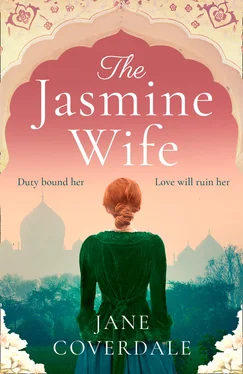His face showed no emotion, though he flexed his hands behind his back as he paced amongst the potted begonias.
“Do I know the fellow?”
“No, he’s someone I’ve known for a long time.” She stared at her feet so he wouldn’t see her eyes.
“I promised him my answer within the week.”
“Does this mean you’ll accept him?”
“The family is very fond of him, and so am I really …” but here she hesitated, then sighed, hoping to plant a little seed of doubt in his mind.
“But he’s a highly respectable man with a bright future … so …”
She had almost begun to believe in her fictitious fiancé herself.
Charles left the house deep in thought, and Sara was convinced she’d never see him again.
“Well?” Her aunt met her at the door, her uncle standing behind with a foolish smile on his lips.
She tried to speak but no sounds came out. Her humiliation was too great. She rushed to her bedroom, her face averted, her aunt’s bitter words following her up the stairs.
“Whatever did you do wrong this time?”
Later, when she emerged, her face red and swollen with shame, her relations scarcely bothered to hide the fact they thought she was nothing more than a liability.
She thought back to that evening’s long, silent, unendurable meal, the air thick with disapproval. Her uncle’s furious tight-lipped sawing of the roast, his resentful way of handing her the plate without looking at her, and how he gave her less meat than usual.
Now there was no escaping the endless censure and, with the departure of Charles, there was nothing and no one to look forward to, just endless days of boredom or visiting her aunt’s stuffy friends and walking the pekes. She’d developed a hatred of the poor things.
The next morning, in an attempt to recapture her lost pride, she put forward the idea of going to India by herself.
“Hundreds of girls do it.” She raised her chin and glared, even though she knew she might have gone too far. “Why should I have to wait for a husband to take me …?”
Her uncle was moved enough by her outburst to put down his newspaper in a way calculated to increase her fear of him. “So, you would join a shipload of common shopgirls, to trawl amongst the rabble of India for a husband? Simply because you can’t find one here … or won’t,” he added, referring to the time when she had refused what was seen as a perfectly good offer from a country parson with a generous living because she couldn’t bear the way he blew his nose then examined the contents of his handkerchief.
For almost a week she was hardly spoken to; the outrage was too deep.
It was while she sat, frozen with humiliation, staring down at her untouched breakfast, that the maid had entered and announced Mr Charles Fitzroy was waiting in the library.
“Perhaps he forgot his hat?” her uncle remarked cattily as she flew out of the room. In the hallway she took a moment to tidy her hair and compose her face into what she thought was an expression of pleasant unconcern before she opened the door to face him once more. Even so, her voice came out husky and cracked. “Mr Fitzroy? I didn’t expect to see you again.”
He was standing by the window staring out at the garden, still covered in a thin layer of morning frost, then, with what seemed an enormous effort of will, he turned to face her.
“I’ve been thinking …” He took a deep breath and swallowed hard, unable to look at her while rolling his hat around in his hands. “Look, I can’t accept you’ll marry this other fellow. I had it in mind that you might marry me.”
She held onto the back of a chair for support. “You didn’t mention this before,” she answered at last, her voice shaking.
“It didn’t seem fair to ask you to give up your life here, but it seems if I wait any longer you are lost to me. Though if you love this other fellow …”
“No, I don’t love him,” she managed to blurt out, “I never have. I was going to refuse him.”
He took a step closer. “Are you going to refuse me?”
She had just enough self-control to pause for a respectable time before answering, then to allow him to take her in his arms and clumsily brush their lips together.
Then the relief, the blessed relief, to be able to announce she’d received a proposal of marriage from Charles Fitzroy, and that she’d accepted him.
It was decided to arrange a special licence so they could be married almost at once, then sail for India together on the same day of the marriage, therefore saving the cost of a honeymoon.
Later, when the first throes of excitement had died down, Sara examined her reasons for accepting him. She was fairly sure she loved him, of course, although it had taken her some time to realise it. He’d been lured to the house by her ever-hopeful aunt, as had many other young men before him, and placed as an offering at her feet. Knowing she was expected to encourage him, she’d felt a stubborn resentment, telling herself he was no different from all the others.
Then, while they’d been playing tennis in the garden and he’d paused to take a breath, he was, without warning, suddenly illuminated. He stood with his shoulders back, his chest heaving from the pace of play, one hand on his hip and the other holding his racquet nobly by his side in the attitude of a Greek god. In the soft afternoon light, with the sun shining on his bright blond hair, he appeared almost unbearably heroic.
For a few moments it was as though the world had stopped spinning, and she remembered the flash of realisation.
I love him! I’m in love!
With that insight everything changed, and she couldn’t be easy around him any more. Just brushing her hand by accident on his caused such an intense mingling of pleasure and fear, she felt sure he must know. Even her laughter became forced and unnatural, and she couldn’t look into his eyes without blushing and turning away.
He was different to the other men in her narrow circle.
He was on leave from India for only a few weeks and brought with him into the stuffy air of parsons and bank clerks a lingering atmosphere of adventure and glamour. He told of cobras found asleep in the billiard room at the club, of tiger shoots and playing polo in the shadow of faded pink palaces. But, most of all, he intrigued her with his tales of the Indian people, their strange customs and powerful beliefs, transporting her back to her childhood and the world she so longed to recapture.
As a child she’d gone to bed each night hungrily devouring library books written by yet another female traveller, either fictitious or factual, braving it alone in foreign climes. The women she admired rode disguised in flowing robes on testy camels over vast deserts, or roamed the South Pacific in search of their tropical destiny.
She’d wanted to be one of those women, but how she would go about it was uncertain until Charles had appeared.
For Charles, it was a revelation to watch her shining eyes and rapt expression every time he spoke. It occurred to him it would be very pleasant to come home every night to such an infatuated creature. Though he couldn’t know it, it was not so much his masculine charm that caused her face to light up whenever he spoke of India. It was India itself and the prospect of adventure, or perhaps discovering something of her past, that held her spellbound.
He almost visibly shuddered when he thought about some of the girls he’d met in India. Like the other men in his crowd, he cast a calculating eye over the cargo of English girls, the so-called “fishing fleet”, who arrived every October and stayed till the beginning of the hot season in the hope they’d find suitable husbands. He found the idea of choosing from amongst them impossible, as even the plainest and poorest of them showed an unbecoming haughtiness. For the first time in their lives, these girls found themselves in demand, and were going to make the most of it, despite the fact most of them, in his eyes, were only just passable.
Читать дальше












